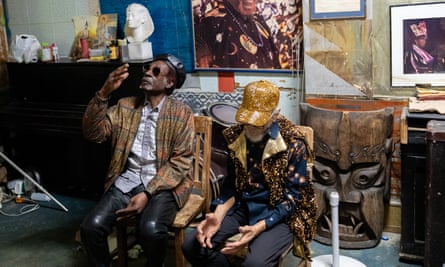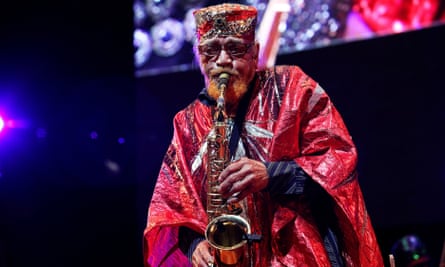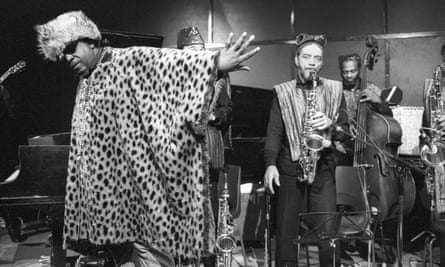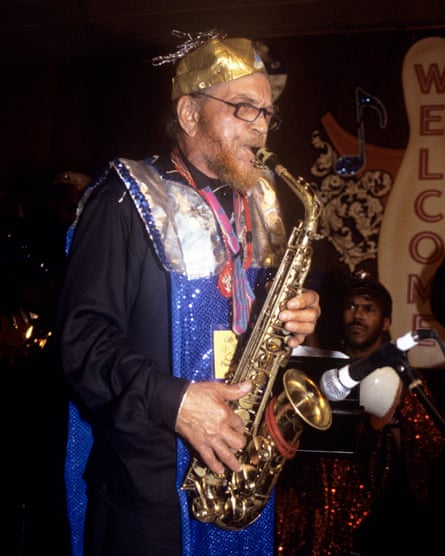G
Germantown, located near Philadelphia, is a typical small town in the northeastern United States. While some areas feature grand mansions, others have abandoned apartment buildings. In addition, there are rows of connected houses that can be challenging to differentiate, but one of them holds a unique historical significance.
Sun Ra resided at 5626 Morton Street from the late 1960s until his passing in 1993. This address is also home to several members of his remarkable jazz group, the Arkestra. The living room serves as the main rehearsal space for the Arkestra and acts as a tribute to their pioneering leader – a musician known for his adventurous and open-minded approach. The room is a reflection of Ra’s eclectic life, filled with otherworldly sculptures, celestial decorations, portraits and paintings, plaques commemorating honorary citizenship in Atlanta and New Orleans, a damaged upright bass, and a rusted hi-hat.
Marshall Allen, who has been a member of the Arkestra since 1957 and its leader for almost 30 years, shared that his father had offered him a house to stay in and for the band to relocate there. I met him at the house in November when he was 99 years old. Although he has retired from international touring, the Arkestra is currently discussing their plans for the future.
The previous owner of the house was a truck driver who had large tires stored upstairs. Allen found this amusing and threw them out in the backyard. Since he already owned a home in Germantown, he declined his father’s offer to take over the house, but suggested selling it to Sun Ra instead. His father agreed and sold the house to Sun Ra for one dollar. The house was then used as a living space for band members, with a designated area for rehearsals. However, currently, the focus is on renovating the house and there is minimal rehearsal happening.

Arts organizations have supported efforts to address significant structural problems, and various members of the Arkestra have contributed to necessary repairs. “Sun Ra was unable to relocate due to illness, so we installed a new toilet in the back,” explains Allen, gesturing towards the rear of the building. “Our drummer also happens to be a skilled plumber.”
Unfortunately, the house’s deteriorating condition, including peeling paint and chipped brickwork, diminishes its importance. However, there are intentions to recognize it as a historical landmark. As you sit in the rehearsal space, you cannot help but notice a change in the atmosphere – a strong presence from all the past and present members of the Arkestra who have performed in that room, particularly Ra himself. He was someone who embraced the avant-garde and pushed the boundaries of experimental music, while also uplifting Black pride in the present moment.
According to Vincent Chancey, a French horn player in the Arkestra since 1976, Ra claims to have been sent to Earth from another planet. He believes he had a encounter on a spaceship where aliens informed him that he had a duty to save the Black community. Ra’s belief in the cosmic realm was ahead of other musical groups, like Parliament-Funkadelic. He had personal motivations for wanting to rise above earthly boundaries and bring liberation to Black Americans. Ra, Allen, and another leader of the Arkestra, John Gilmore, all originated from the segregated American South.

Herman Poole Blount, later known as Ra, was born in Birmingham, Alabama in 1914. He showed a natural talent for piano and began composing music at a young age. He had the opportunity to meet and be influenced by prominent musicians such as Duke Ellington and Fletcher Henderson when they visited Birmingham on tour. Ra received a scholarship to study music education at Alabama A&M University, but decided to leave after completing only one year.
During this period, Ra had an encounter with extraterrestrial beings. When he came to Chicago, he became deeply interested in science fiction and reinterpreted spiritual texts. He also became more aware of the struggles faced by Black Americans and their ties to ancient Egypt. Drawing from his previous exposure to influential jazz and big band musicians, Ra developed the concept of “Astro-Black mythology”, which combined ancient history with a vision of a futuristic utopia for Black people through an interplanetary journey.
Allen, on the other hand, was born in Louisville, Kentucky and later moved to Philadelphia with his father. When he turned 18, he joined the military and served as a musician, playing the alto saxophone and clarinet in the 17th Division Special Service Band. This band was a part of the 92nd infantry division, also known as the Buffalo Soldiers, and is famous for its African American members. Allen is now one of the few remaining members of this celebrated Black Cavalry.
During his time in Europe, Allen had the opportunity to play with notable musicians like Coleman Hawkins, Don Byas, Art Simmons, and James Moody. He even had the chance to perform with members of Duke Ellington’s band. After being honorably discharged in 1949, he chose to continue his music education at the Paris Conservatory in France, focusing on clarinet.

Display the image in full screen mode.
After being away for almost ten years, Allen returned to the United States in 1951 and settled in Chicago, where his mother resided. He spent a couple of years there, playing with different musicians and accepting any gigs that came his way. One day, he visited a record store owned by Joe Segal and purchased a demo of Sun Ra. Asking longtime Arkestra saxophonist Knoel Scott for help in identifying the tune, Allen recalled being impressed by the swing tune. Scott attempted to hum the melody to jog his memory, but Allen couldn’t quite remember it. However, he was interested in joining the band after Segal mentioned that Sun Ra was always on the lookout for talented musicians and rehearsed every night in Chicago.
Allen took his drummer along with him to meet Ra. “We went up to the boiler room where Sun Ra was rehearsing. He was talking about outer space. I was saying: ‘What kind of band is this? I want to be in this band!’”
Allen added the flute to his collection and started performing with the Arkestra in various cities such as Chicago, Milwaukee, and Montreal. While on tour, they made a stop in New York to visit former bandmates, but their car was hit by a taxi, leaving them stranded without transportation or money. Each member had to survive on only 25 cents a day, relying on teamwork to make ends meet. These experiences brought the members of the Arkestra closer together, forming a strong family bond.
George Burton, who joined the Arkestra in 2012 as a viola and violin player, and later as a pianist, describes the band as having a rich history. He also notes the strong bond and camaraderie amongst the members, which has been strengthened by their constant touring. This closeness translates into their performances, which are filled with raw emotion and constantly evolving. Unlike other bands where the music is strictly planned and directed by the composer, the Arkestra allows for constant creativity and improvisation on stage. There is no set formula for their music, making each performance a unique experience.
Although many have characterized Sun Ra’s music as spontaneous and unrestricted, Allen and Scott argue that it is actually quite the opposite. According to Scott, Sun Ra strongly disliked the concept of “freedom” and instead valued discipline and accuracy. He approached his compositions with a scientific approach, using equations to carefully plan and structure his music. This was often misunderstood by others who thought they were playing freely.
Allen slowly became accustomed to Sun Ra’s principles. “It took several years for me to understand what he meant, so I had to learn the hard way by working tirelessly. Discipline is necessary for learning. All it required was your time.”
“He would often say, ‘Your playing has a pleasant sound, but there’s something lacking.’ That missing element was the spirit, which he focused on. It wasn’t that I couldn’t play or didn’t have a sound – I couldn’t play his music. Eventually, when I did understand the spirit of the music, it wasn’t just about playing the correct notes, but also about the way they were played. It came from within, from the heart,” Allen reflects.
Ra’s composition style was unpredictable. After Allen worked all week on a new part he’d been handed, he realised that “Ra can change it, give it to somebody else, and give you a whole new part. It wasn’t easy. He would say: ‘I don’t want you to know anything. If you know something, it hinders you.’”
After Sun Ra passed away in 1993, the term Afrofuturism was created by writer Mark Dery. Based on Ra’s otherworldly ideas, it has been applied to various works such as those of Grace Jones and Octavia Butler. Afrofuturism envisions a unique space and time for Black Americans, separate from their tumultuous history, uncertain present, and unpredictable future.

“I continue to struggle with accurately describing that,” says Tara Middleton, who has been a vocalist and violinist in the Arkestra since 2012. “Sun Ra’s Afrofuturistic vision is deeply rooted in cosmic philosophy. It envisions a future for Black people that is liberated from societal and political constraints imposed by historical narratives. His music embodies this cosmic consciousness, inspiring people to embrace limitless possibilities in life, while also incorporating elements of African mythology and symbolism.”
Middleton is currently the only woman in the Arkestra, following in the footsteps of singer June Tyson. With a strong presence in Harlem’s artistic community, Tyson’s voice served as a guide for young listeners to explore Sun Ra’s imaginative world.
Melanie Dyer, founder of WeFreeStrings and a former member of the Arkestra, describes June Tyson as resembling an apostle to her. According to Dyer, Tyson embodied the spirit and teachings of Sun Ra and delivered them with a vibrant and passionate voice. Dyer also acknowledges the band’s collective strength, with Tyson playing a key role in generating their powerful presence.
In 2007, Sun Ra’s recordings, manuscripts, photographs, and other materials were acquired by The University of Chicago Library, while Emory University also holds an archive of their work. In 2021, the group received their first Grammy nomination in the category of best large jazz ensemble for their album Swirling. However, the true legacy of the Arkestra lies in its members and their extensive collection of music, which is nearly impossible to fully comprehend. According to Allen, there is an abundance of Sun Ra’s music, with enough to sort through for the next 20 years. He wrote music with the same ease as one would write a letter.
Middleton stated that the Arkestra’s senior members will be responsible for making decisions regarding the band’s leadership in the future. She described the process of passing on leadership as a balancing act between honoring the band’s legacy and allowing for growth and evolution. With newer members joining the stage, the band is seen as a vibrant and ever-evolving entity.
As Marshall Allen nears his 100th birthday in May, he attributes his longevity to Sun Ra and echoes his mentor’s belief in discipline being essential for success. Although he is no longer touring internationally, his music continues to thrive as he focuses on his work from a stationary position. When asked about his plans for his birthday, Allen simply responds that he plans to remain alive through any means necessary.
Source: theguardian.com





















